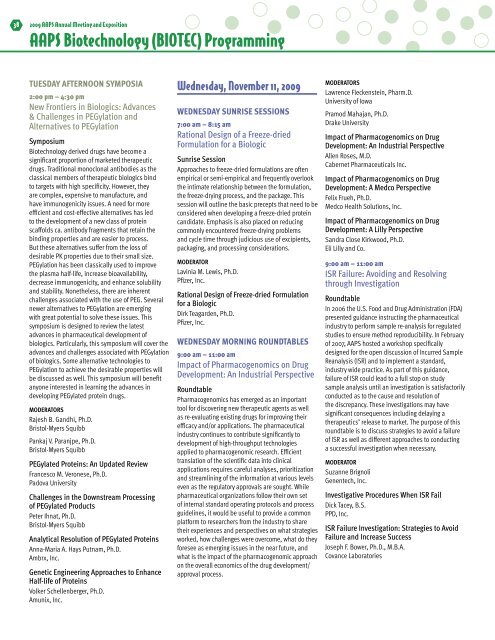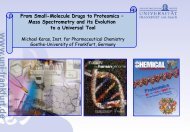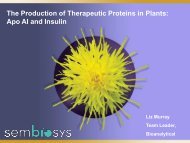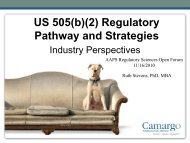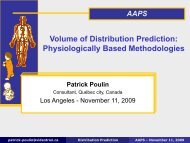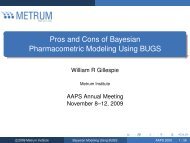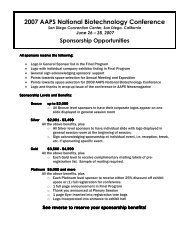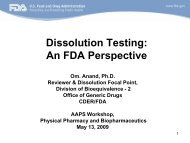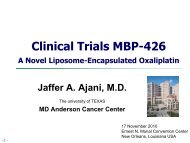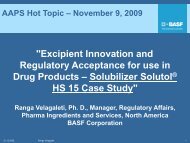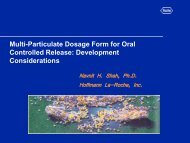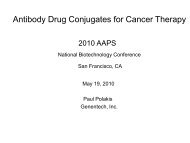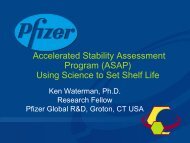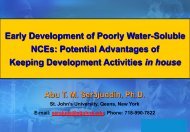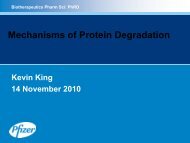Preliminary Program - American Association of Pharmaceutical ...
Preliminary Program - American Association of Pharmaceutical ...
Preliminary Program - American Association of Pharmaceutical ...
Create successful ePaper yourself
Turn your PDF publications into a flip-book with our unique Google optimized e-Paper software.
38<br />
2009 AAPS Annual Meeting and Exposition<br />
AAPS Biotechnology (BIOTEC) <strong>Program</strong>ming<br />
TUESDAY AFTERNOON SYMPOSIA<br />
2:00 pm – 4:30 pm<br />
New Frontiers in Biologics: Advances<br />
& Challenges in PEGylation and<br />
Alternatives to PEGylation<br />
Symposium<br />
Biotechnology derived drugs have become a<br />
significant proportion <strong>of</strong> marketed therapeutic<br />
drugs. Traditional monoclonal antibodies as the<br />
classical members <strong>of</strong> therapeutic biologics bind<br />
to targets with high specificity. However, they<br />
are complex, expensive to manufacture, and<br />
have immunogenicity issues. A need for more<br />
efficient and cost-effective alternatives has led<br />
to the development <strong>of</strong> a new class <strong>of</strong> protein<br />
scaffolds ca. antibody fragments that retain the<br />
binding properties and are easier to process.<br />
But these alternatives suffer from the loss <strong>of</strong><br />
desirable PK properties due to their small size.<br />
PEGylation has been classically used to improve<br />
the plasma half-life, increase bioavailability,<br />
decrease immunogenicity, and enhance solubility<br />
and stability. Nonetheless, there are inherent<br />
challenges associated with the use <strong>of</strong> PEG. Several<br />
newer alternatives to PEGylation are emerging<br />
with great potential to solve these issues. This<br />
symposium is designed to review the latest<br />
advances in pharmaceutical development <strong>of</strong><br />
biologics. Particularly, this symposium will cover the<br />
advances and challenges associated with PEGylation<br />
<strong>of</strong> biologics. Some alternative technologies to<br />
PEGylation to achieve the desirable properties will<br />
be discussed as well. This symposium will benefit<br />
anyone interested in learning the advances in<br />
developing PEGylated protein drugs.<br />
Moderators<br />
Rajesh B. Gandhi, Ph.D.<br />
Bristol-Myers Squibb<br />
Pankaj V. Paranjpe, Ph.D.<br />
Bristol-Myers Squibb<br />
PEGylated Proteins: An Updated Review<br />
Francesco M. Veronese, Ph.D.<br />
Padova University<br />
Challenges in the Downstream Processing<br />
<strong>of</strong> PEGylated Products<br />
Peter Ihnat, Ph.D.<br />
Bristol-Myers Squibb<br />
Analytical Resolution <strong>of</strong> PEGylated Proteins<br />
Anna-Maria A. Hays Putnam, Ph.D.<br />
Ambrx, Inc.<br />
Genetic Engineering Approaches to Enhance<br />
Half-life <strong>of</strong> Proteins<br />
Volker Schellenberger, Ph.D.<br />
Amunix, Inc.<br />
Wednesday, November 11, 2009<br />
WEDNESDAY SUNRISE SESSIONS<br />
7:00 am – 8:15 am<br />
Rational Design <strong>of</strong> a Freeze-dried<br />
Formulation for a Biologic<br />
Sunrise Session<br />
Approaches to freeze-dried formulations are <strong>of</strong>ten<br />
empirical or semi-empirical and frequently overlook<br />
the intimate relationship between the formulation,<br />
the freeze-drying process, and the package. This<br />
session will outline the basic precepts that need to be<br />
considered when developing a freeze-dried protein<br />
candidate. Emphasis is also placed on reducing<br />
commonly encountered freeze-drying problems<br />
and cycle time through judicious use <strong>of</strong> excipients,<br />
packaging, and processing considerations.<br />
Moderator<br />
Lavinia M. Lewis, Ph.D.<br />
Pfizer, Inc.<br />
Rational Design <strong>of</strong> Freeze-dried Formulation<br />
for a Biologic<br />
Dirk Teagarden, Ph.D.<br />
Pfizer, Inc.<br />
WEDNESDAY morning roundtables<br />
9:00 am – 11:00 am<br />
Impact <strong>of</strong> Pharmacogenomics on Drug<br />
Development: An Industrial Perspective<br />
Roundtable<br />
Pharmacogenomics has emerged as an important<br />
tool for discovering new therapeutic agents as well<br />
as re-evaluating existing drugs for improving their<br />
efficacy and/or applications. The pharmaceutical<br />
industry continues to contribute significantly to<br />
development <strong>of</strong> high-throughput technologies<br />
applied to pharmacogenomic research. Efficient<br />
translation <strong>of</strong> the scientific data into clinical<br />
applications requires careful analyses, prioritization<br />
and streamlining <strong>of</strong> the information at various levels<br />
even as the regulatory approvals are sought. While<br />
pharmaceutical organizations follow their own set<br />
<strong>of</strong> internal standard operating protocols and process<br />
guidelines, it would be useful to provide a common<br />
platform to researchers from the industry to share<br />
their experiences and perspectives on what strategies<br />
worked, how challenges were overcome, what do they<br />
foresee as emerging issues in the near future, and<br />
what is the impact <strong>of</strong> the pharmacogenomic approach<br />
on the overall economics <strong>of</strong> the drug development/<br />
approval process.<br />
Moderators<br />
Lawrence Fleckenstein, Pharm.D.<br />
University <strong>of</strong> Iowa<br />
Pramod Mahajan, Ph.D.<br />
Drake University<br />
Impact <strong>of</strong> Pharmacogenomics on Drug<br />
Development: An Industrial Perspective<br />
Allen Roses, M.D.<br />
Cabernet <strong>Pharmaceutical</strong>s Inc.<br />
Impact <strong>of</strong> Pharmacogenomics on Drug<br />
Development: A Medco Perspective<br />
Felix Frueh, Ph.D.<br />
Medco Health Solutions, Inc.<br />
Impact <strong>of</strong> Pharmacogenomics on Drug<br />
Development: A Lilly Perspective<br />
Sandra Close Kirkwood, Ph.D.<br />
Eli Lilly and Co.<br />
9:00 am – 11:00 am<br />
ISR Failure: Avoiding and Resolving<br />
through Investigation<br />
Roundtable<br />
In 2006 the U.S. Food and Drug Administration (FDA)<br />
presented guidance instructing the pharmaceutical<br />
industry to perform sample re-analysis for regulated<br />
studies to ensure method reproducibility. In February<br />
<strong>of</strong> 2007, AAPS hosted a workshop specifically<br />
designed for the open discussion <strong>of</strong> Incurred Sample<br />
Reanalysis (ISR) and to implement a standard,<br />
industry wide practice. As part <strong>of</strong> this guidance,<br />
failure <strong>of</strong> ISR could lead to a full stop on study<br />
sample analysis until an investigation is satisfactorily<br />
conducted as to the cause and resolution <strong>of</strong><br />
the discrepancy. These investigations may have<br />
significant consequences including delaying a<br />
therapeutics’ release to market. The purpose <strong>of</strong> this<br />
roundtable is to discuss strategies to avoid a failure<br />
<strong>of</strong> ISR as well as different approaches to conducting<br />
a successful investigation when necessary.<br />
Moderator<br />
Suzanne Brignoli<br />
Genentech, Inc.<br />
Investigative Procedures When ISR Fail<br />
Dick Tacey, B.S.<br />
PPD, Inc.<br />
ISR Failure Investigation: Strategies to Avoid<br />
Failure and Increase Success<br />
Joseph F. Bower, Ph.D., M.B.A.<br />
Covance Laboratories


